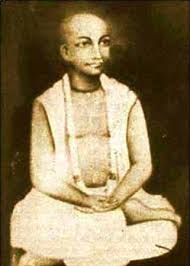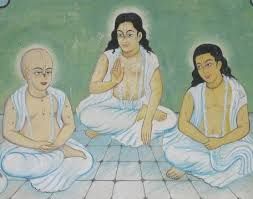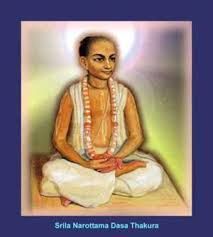Srila Narottama dasa Thakura and Sri Srinivasa acarya
Srila Prabhupada explains the unique position of Narottama dasa Thakura in the Gaudiya sampradaya.
Lectures : Srimad-Bhagavatam Lectures : Canto 7: Lectures : SB 7.12: Lectures : Srimad-Bhagavatam 7.12.6 — Bombay, April 17, 1976 : 760417SB.BOM : Dakṣa śraddadhānaḥ: faithful. Faithful to whom? To the spiritual master. Whatever he says, the brahmacārī should take it: “Yes, it is my life and soul.” That is the explanation given by Viśvanātha Cakravartī Ṭhākura. He is explaining with reference to the verse vyavasāyātmikā buddhir ekeha kuru-nandana [Bg. 2.41]. He very nicely explains. You have perhaps read it, Viśvanātha Cakravartī Ṭhākura’s… Viśvanātha Cakravartī Ṭhākura has taught very, very nicely about guru. Therefore he has written in Gurvaṣṭaka, yasya prasādād bhagavat-prasādaḥ **. He is example, practical example of guru-bhakti, Viśvanātha Cakravartī Ṭhākura. He accepted his guru, Narottama dāsa Ṭhākura. So he said that “I am not interested for my salvation or going back to Godhead. I am not interested.” Interested means it may come; it may not come. “That I don’t mind. But I am interested only with the words of my guru.” Viśvanātha Cakravartī said. “That is my life. Whether I will be successful or not successful, it doesn’t matter. I must take the words of my Guru Mahārāja as my life and soul.”\
Lectures : Sri Caitanya-caritamrta Lectures : Madhya-lila: Lectures : Madhya 20: Lectures : Sri Caitanya-caritamrta, Madhya-lila 20.100-108 — New York, November 22, 1966 : 661122C2.NY : So Sanātana Gosvāmī, he’s ācārya in this disciplic succession from Caitanya Mahāprabhu, Lord Caitanya. He is the first disciple of Lord Caitanya, and from him, Sanātana Gosvāmī, six Gosvāmīs. There were six among the first followers of Lord Caitanya. And then, from next step comes Raghunātha Gosvāmī and then this author of this book, Kṛṣṇa dāsa Kavirāja Gosvāmī, and from him, Narottama dāsa Ṭhākura, and then from him, Viśvanātha Cakravartī, Baladeva Vidyābhūṣaṇa. In this way this disciplic succession is coming from Lord Caitanya. So as ācārya… Ācārya means one who knows the principles of scripture, properly being initiated by authority who knows things as they are, and they apply those things in their own life. They are called ācārya. Acinoti śāstrāṇi: he must know all the principles from authorities, and he should apply in his life those principles. Not that he knows but does not apply. He cannot be ācārya. Āpani ācari prabhu jīva disa (?). Lord Caitanya, He, although He is accepted as the, I mean to say, the personal, He’s Kṛṣṇa Himself, still, He behaved in such a way that others can follow. He also accepted Īśvara Purī. Īśvara, Īśvara Purī was His spiritual master, Lord Caitanya’s. This is the disciplic succession
Lectures : Nectar of Devotion Lectures : The Nectar of Devotion — Vrndavana, November 13, 1972 : 721113ND.VRN : Prabhupāda: The Gosvāmīs, or in the Pañcarātra system, in the śāstras, the regulative principles are so made that, if we practice it, gradually our dormant Kṛṣṇa consciousness will be awakened. Therefore these prescribed rules and regulations, as it is given in the śāstras and confirmed by the ācāryas… Narottama dāsa Ṭhākura says, tāṅdera caraṇa-sevi. We have to follow the footprints of the ācāryas. Ācārya means paramparā. One ācārya is following the previous ācārya. An ācārya does not manufacture anything, something novel. He follows the previous ācārya. And therefore he, he’s ācārya. And one who follows… Ācāryavān puruṣo veda. Ācārya upāsanam. In the Bhagavad-gītā it is said. So we have to accept the principles laid down by the ācāryas. Tāṅdera caraṇa-sevi-bhakta-sane vāsa
Books : Srimad-Bhagavatam : Canto 1:”Creation” : SB Introduction : SB Introduction : Many devotees of Lord Caitanya like Śrīla Vṛndāvana dāsa Ṭhākura, Śrī Locana dāsa Ṭhākura, Śrīla Kṛṣṇadāsa Kavirāja Gosvāmī, Śrī Kavikarṇapūra, Śrī Prabodhānanda Sarasvatī, Śrī Rūpa Gosvāmī, Śrī Sanātana Gosvāmī, Śrī Raghunātha Bhaṭṭa Gosvāmī, Śrī Jīva Gosvāmī, Śrī Gopāla Bhaṭṭa Gosvāmī, Śrī Raghunātha dāsa Gosvāmī and in this latter age within two hundred years, Śrī Viśvanātha Cakravartī, Śrī Baladeva Vidyābhūṣana, Śrī Śyāmānanda Gosvāmī, Śrī Narottama dāsa Ṭhākura, Śrī Bhaktivinoda Ṭhākura and at last Śrī Bhaktisiddhānta Sarasvatī Ṭhākura (our spiritual master) and many other great and renowned scholars and devotees of the Lord have prepared voluminous books and literatures on the life and precepts of the Lord. Such literatures are all based on the śāstras like the Vedas, Purāṇas, Upaniṣads, Rāmāyaṇa, Mahābhārata and other histories and authentic literatures approved by the recognized ācāryas. They are unique in composition and unrivaled in presentation, and they are full of transcendental knowledge. Unfortunately the people of the world are still ignorant of them, but when these literatures, which are mostly in Sanskrit and Bengali, come to light the world and when they are presented before thinking people, then India’s glory and the message of love will overflood this morbid world, which is vainly searching after peace and prosperity by various illusory methods not approved by the ācāryas in the chain of disciplic succession.
Books : Srimad-Bhagavatam : Canto 1:”Creation” : SB 1.10: Departure of Lord Krsna for Dvaraka : SB 1.10.20 : PURPORT : …. Anything sung in the praise of the Lord is Śruti-mantra. There are songs of Ṭhākura Narottama dāsa, one of the ācāryas in the Gauḍīya-sampradāya, composed in simple Bengali language. But Ṭhākura Viśvanātha Cakravartī, another very learned ācārya of the same sampradāya, has approved the songs by Ṭhākura Narottama dāsa to be as good as Vedic mantras. And this is so because of the subject matter. The language is immaterial, but the subject matter is important. The ladies, who were all absorbed in the thought and actions of the Lord, developed the consciousness of Vedic wisdom by the grace of the Lord. And therefore although such ladies might not have been very learned scholars in Sanskrit or otherwise, still whatever they spoke was more attractive than the Vedic hymns. The Vedic hymns in the Upaniṣads are sometimes indirectly directed to the Supreme Lord. But the talks of the ladies were directly spoken of the Lord, and thus they were more pleasing to the heart. The ladies’ talks appeared to be more valuable than the learned brāhmaṇas’ benedictions.
Books : Srimad-Bhagavatam : Canto 3: “The Status Quo” : SB 3.13: The Appearance of Lord Varaha : SB 3.13.8 : PURPORT : Brahmā is the direct recipient of Vedic knowledge from the Personality of Godhead, and anyone discharging his entrusted duties in disciplic succession from Brahmā is sure to gain fame in this life and salvation in the next. The disciplic succession from Brahmā is called the Brahma-sampradāya, and it descends as follows: Brahmā, Nārada, Vyāsa, Madhva Muni (Pūrṇaprajña), Padmanābha, Nṛhari, Mādhava, Akṣobhya, Jayatīrtha, Jñānasindhu, Dayānidhi, Vidyānidhi, Rājendra, Jayadharma, Puruṣottama, Brahmaṇyatīrtha, Vyāsatīrtha, Lakṣmīpati, Mādhavendra Purī, Īśvara Purī, Śrī Caitanya Mahāprabhu, Svarūpa Dāmodara and Śrī Rūpa Gosvāmī and others, Śrī Raghunātha dāsa Gosvāmī, Kṛṣṇadāsa Gosvāmī, Narottama dāsa Ṭhākura, Viśvanātha Cakravartī, Jagannātha dāsa Bābājī, Bhaktivinoda Ṭhākura, Gaurakiśora dāsa Bābājī, Śrīmad Bhaktisiddhānta Sarasvatī, A. C. Bhaktivedanta Swami.
Srila Prabhupada cites from Narottama dasa Thakura.
Books : Srimad-Bhagavatam : Canto 3: “The Status Quo” : SB 3.26: Fundamental Principles of Material Nature : SB 3.26.26 : PURPORT : Ahaṅkāra, or false ego, is transformed into the demigods, the controlling directors of material affairs. As an instrument, the false ego is represented as different senses and sense organs, and as the result of the combination of the demigods and the senses, material objects are produced. In the material world we are producing so many things, and this is called advancement of civilization, but factually the advancement of civilization is a manifestation of the false ego. By false ego all material things are produced as objects of enjoyment. One has to cease increasing artificial necessities in the form of material objects. One great ācārya, Narottama dāsa Ṭhākura, has lamented that when one deviates from pure consciousness of Vāsudeva, or Kṛṣṇa consciousness, he becomes entangled in material activities. The exact words he uses are, sat-saṅga chāḍi’ kainu asate vilāsa/ te-kāraṇe lāgila ye karma-bandha-phāṅsa: “I have given up the pure status of consciousness because I wanted to enjoy in the temporary, material manifestation; therefore I have been entangled in the network of actions and reactions.”
Books : Srimad-Bhagavatam : Canto 3: “The Status Quo” : SB 3.28: Kapila’s Instructions on the Execution of Devotional Service : SB 3.28.4 : PURPORT : Svādhyāyaḥ means “reading the authorized Vedic scriptures.” Even if one is not Kṛṣṇa conscious and is practicing the yoga system, he must read standard Vedic literatures in order to understand. Performance of yoga alone is not sufficient. Narottama dāsa Ṭhākura, a great devotee and ācārya in the Gauḍīya Vaiṣṇava-sampradāya, says that all spiritual activities should be understood from three sources, namely saintly persons, standard scriptures and the spiritual master. These three guides are very important for progress in spiritual life. The spiritual master prescribes standard literature for the prosecution of the yoga of devotional service, and he himself speaks only from scriptural reference. Therefore reading standard scriptures is necessary for executing yoga. Practicing yoga without reading the standard literatures is simply a waste of time.
Books : Srimad-Bhagavatam : Canto 3: “The Status Quo” : SB 3.31: Lord Kapila’s Instructions on the Movements of the Living Entities : SB 3.31.29 : PURPORT : To raise oneself from hellish life to the highest position of spiritual understanding is to transform this lust into love of Kṛṣṇa. Śrī Narottama dāsa Ṭhākura, a great ācārya of the Vaiṣṇava sampradāya, said, kāma kṛṣṇa-karmārpaṇe: due to our lust, we want many things for our sense gratification, but the same lust can be transformed in a purified way so that we want everything for the satisfaction of the Supreme Personality of Godhead. Anger also can be utilized towards a person who is atheistic or who is envious of the Personality of Godhead. As we have fallen into this material existence because of our lust and anger, the same two qualities can be utilized for the purpose of advancing in Kṛṣṇa consciousness, and one can elevate himself again to his former pure, spiritual position. Śrīla Rūpa Gosvāmī has therefore recommended that because in material existence we have so many objects of sense gratification, which we need for the maintenance of the body, we should use all of them without attachment, for the purpose of satisfying the senses of Kṛṣṇa; that is actual renunciation.
Books : Srimad-Bhagavatam : Canto 4: “The Creation of the Fourth Order” : SB 4.4: Sati Quits Her Body : SB 4.4.10 : PURPORT Lord Caitanya, who always preached nonviolence, meekness and humility, also became angry when Nityānanda was offended by Jagāi and Mādhāi, and He wanted to kill them. When Viṣṇu or a Vaiṣṇava is blasphemed or dishonored, one should be very angry. Narottama dāsa Ṭhākura said, krodha bhakta-dveṣi jane. We have anger, and that anger can be a great quality when directed against a person who is envious of the Supreme Personality of Godhead or His devotee. One should not be tolerant when a person is offensive towards Viṣṇu or a Vaiṣṇava. The anger of Satī towards her father was not objectionable, for although he was her father, he was trying to insult the greatest Vaiṣṇava. Thus Satī’s anger against her father was quite applaudable.
Books : Srimad-Bhagavatam : Canto 4: “The Creation of the Fourth Order” : SB 4.6: Brahma Satisfies Lord Siva : SB 4.6.25 : PURPORT : Another significant point is that Lord Govinda, the Supreme Personality of Godhead, is described here as Tīrthapāda. Tīrtha means “sanctified place,” and pāda means “the lotus feet of the Lord.” People go to a sanctified place to free themselves from all sinful reactions. In other words, those who are devoted to the lotus feet of the Supreme Personality of Godhead, Kṛṣṇa, automatically become sanctified. The Lord’s lotus feet are called tīrtha-pāda because under their protection there are hundreds and thousands of saintly persons who sanctify the sacred places of pilgrimage. Śrīla Narottama dāsa Ṭhākura, a great ācārya of the Gauḍīya Vaiṣṇava-sampradāya, advises us not to travel to different places of pilgrimage. Undoubtedly it is troublesome to go from one place to another, but one who is intelligent can take shelter of the lotus feet of Govinda and thereby be automatically sanctified as the result of his pilgrimage. Anyone who is fixed in the service of the lotus feet of Govinda is called tīrtha-pāda; he does not need to travel on various pilgrimages, for he can enjoy all the benefits of such travel simply by engaging in the service of the lotus feet of the Lord. Such a pure devotee, who has implicit faith in the lotus feet of the Lord, can create sacred places in any part of the world where he decides to remain. Tīrthī-kurvanti tīrthāni (Bhāg. 1.13.10). The places are sanctified due to the presence of pure devotees; any place automatically becomes a place of pilgrimage if either the Lord or His pure devotee remains or resides there. In other words, such a pure devotee, who is engaged one hundred percent in the service of the Lord, can remain anywhere in the universe, and that part of the universe immediately becomes a sacred place where he can peacefully render service to the Lord as the Lord desires.
Books : Srimad-Bhagavatam : Canto 4: “The Creation of the Fourth Order” : SB 4.21: Instructions by Maharaja Prthu : SB-4.21.28, SB-4.21.29, SB-4.21.28-29 : PURPORT : Narottama dāsa Ṭhākura states that one has to ascertain the right path for his activities by following in the footsteps of great saintly persons and books of knowledge under the guidance of a spiritual master (sādhu-śāstra-guru-vākya). A saintly person is one who follows the Vedic injunctions, which are the orders of the Supreme Personality of Godhead. The word guru refers to one who gives proper direction under the authority of the Vedic injunctions and according to the examples of the lives of great personalities. The best way to mold one’s life is to follow in the footsteps of the authorized personalities like those mentioned herein by Pṛthu Mahārāja, beginning with Svāyambhuva Manu. The safest path in life is to follow such great personalities, especially those mentioned in the Śrīmad-Bhāgavatam. The mahājanas, or great personalities, are Brahmā, Lord Śiva, Nārada Muni, Manu, the Kumāras, Prahlāda Mahārāja, Bali Mahārāja, Yamarāja, Bhīṣma, Janaka, Śukadeva Gosvāmī and Kapila Muni.
Books : Srimad-Bhagavatam : Canto 4: “The Creation of the Fourth Order” : SB 4.21: Instructions by Maharaja Prthu
(compiled by Yasoda nandana dasa)










Speak Your Mind